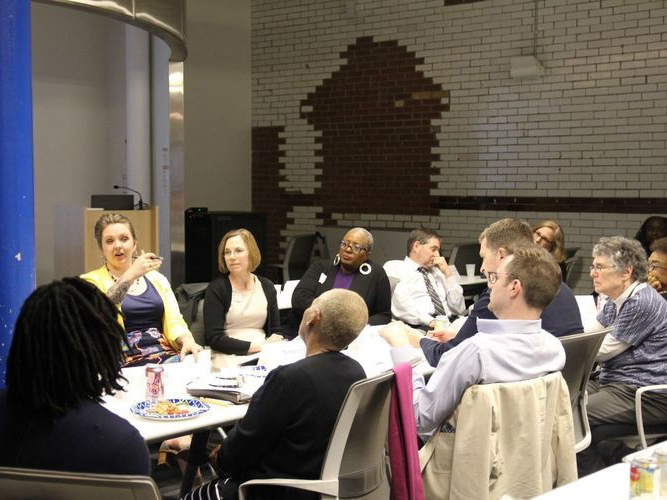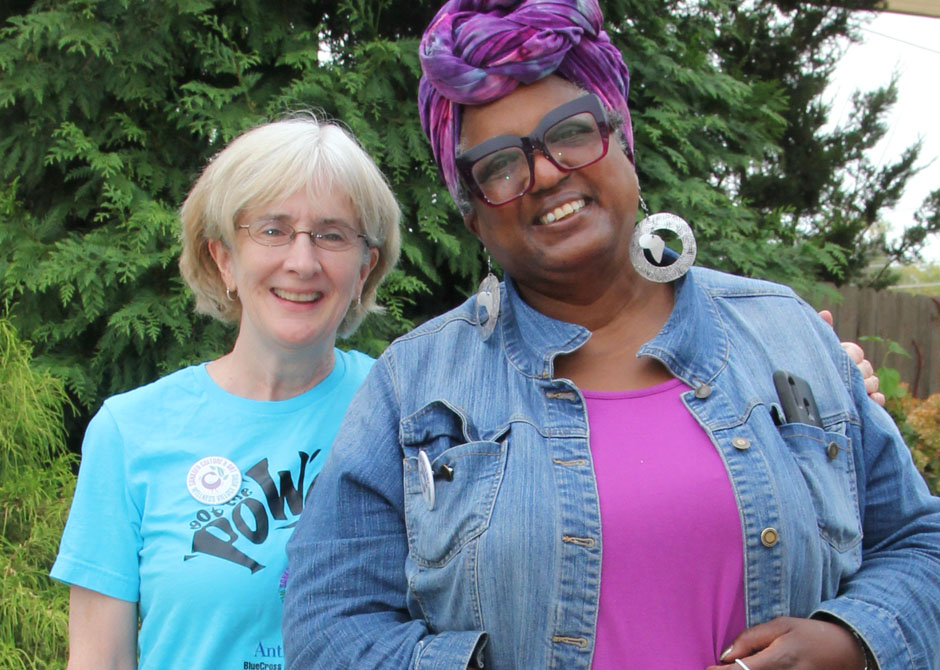A Relationship Begins
One could say she has community in her heart. Rev. Dr. Paulette Sankofa, EdD, grew up in the St. Louis West End and remembers the tight community connections, particularly among older adults that was commonplace at that time. It is this sense of community and respect for seniors instilled as a young child that has shaped much of her life’s work. Today, Sankofa is the founder and executive director of Peace Education Action Compassion and Empowerment (PEACE) Weaving Wholeness, an organization dedicated to helping women and men heal and remain whole by connecting adults ages 60 plus with resources and programs to reduce social isolation by promoting aging in place.
The story of PEACE Weaving Wholeness began in 2013 when Sankofa applied for the inaugural cohort of the Community Research Fellows Training program, a 17-week public health research training course offered to community members through Washington University School of Medicine and Siteman Cancer Center. After graduating from the program equipped with new skills, Sankofa applied for grants to do her own research in collaboration with Vetta Sanders Thompson, PhD, MA, Professor of Social Work and Public Health at the Brown School. Their project examining concerns of homeless women was the basis for Sankofa developing PEACE Weaving Wholeness.
As PEACE Weaving Wholeness was beginning to thrive, Sankofa continued her relationship with Washington University by honing her grant writing skills as a capacity-building scholarship recipient and serving as a community expert in a Community Engagement Studio based on depression in African American seniors. By 2019, Sankofa had gained a breadth and depth of knowledge in community-engaged research and programming for PEACE Weaving Wholeness well underway. She was looking to take the next step.
Pitch Partners Plays Matchmaker
As Sankofa and PEACE Weaving Wholeness were growing their mission in North St. Louis, the Institute for Public Health at Washington University, the Center for Community Health Partnership and Research (CCHPR) and the ICTS/IPH Community Advisory Board were brainstorming ideas to further develop community-academic partnerships. Jason Baker, PhD, lead at the time of the Immigrant Service Providers Network, suggested a softer “Shark Tank” style program where community members could “pitch” their programmatic needs to researchers looking to make connections. Hence, the Pitch Partners series was born as a matchmaking process of sorts, a mutually-beneficial program for both community organizations and investigators to come together, present their needs and see if it sparks a match.
As the Pitch Partners Program rolled out in St. Louis, Susan Stark, PhD, Washington University Associate Professor of Occupational Therapy, Neurology and Social Work and ICTS Integrating Special Populations Co-lead, thought it could be the perfect medium to make connections to the aging community. She collaborated with CCHPR, the Harvey A. Friedman Center for Aging, and ICTS’ Aging Clinical Research Consortium to develop a Pitch Partners event aimed at aging-relevant research. So on April 25, 2019, Stark listened in to the community organizations making their pitches, including Paulette Sankofa’s pitch for a summer camp targeted to older adults.

Impressed with Sankofa’s presentation, Stark immediately thought of her colleague, Christine Berg, PhD, Associate Professor Occupational Therapy and a clinical educator with a history of working with children. And, although her background was working with pediatric populations, Berg was up for the challenge. “When I met Paulette, the magic was there,” recalls Berg. “Our ideas of health and wellness were very similar. She truly is one of a kind, and had the vision. I was thrilled to be able to support and help sustain that vision.”
The two quickly applied for a partnership development grant, were funded and the inaugural Sankofa Culture and Art Wellness Village Senior Summer Camp was established during the summer of 2019. For two weeks, 332 seniors, ages 60 years plus in the Old North St. Louis community participated in a variety of activities focused on art and culture including quilting to storytelling to African drumming. Campers enjoyed these activities and all the while Berg and her Washington University occupational therapy students were hands-on and on-site, assisting with greeting and registering campers.
Community Program Thrives and Sustains with Partnership
Building on momentum from the successful summer camp, PEACE Weaving Wholeness continued programming and became a Naturally Occurring Retirement Community (NORC) collaborative, a designation that allowed the organization to provide year-round programming. Groups from the summer camp naturally continued and over 80 seniors were involved in activities by that fall. Plans were in the works to repeat the summer camp in 2020.
So, when COVID hit in March, 2020, Sankofa knew they had to adapt and fast. With a population that was at critical risk, Sankofa immediately considered how to pivot the camp to a virtual format. “Translating our programming online was going to be necessary and we needed computers to do that,” recalls Sankofa. “Because of the data we had collected in 2019, we were able to approach two new funding sources and apply for grants to fund Chromebooks. Our Washington University partnership and the data we now had on our participants and programming spoke volumes to these funders that we weren’t able to crack in the past.”
Funding from these new sources, the Marillac Mission Fund and the St. Louis City Senior Fund, was secured and camp continued on July 20 with online programming via Chromebooks distributed to more than 50 campers. The seniors were excited to have the virtual social interaction and were quickly engaged in the programming and each other, all accomplished by using Zoom.
Not only did Berg and her team provide the framework for Sankofa to compile critical data to make approaching these funding organizations possible, but her involvement didn’t stop there. Once the seniors received their Chromebooks last spring, Berg worked to train them on how to use Zoom. “Christine (Dr. Berg) has been present in every aspect of this camp,” comments Sankofa. “Someone to help them make the jump to online was critical. And Christine jumped in and helped.”
Sankofa and Berg are currently working together to author a manuscript about the culture and art wellness summer camp program for older adults. And, for the next step in their journey, they are considering other ICTS funding programs like the Partnership Development and Sustainability Support Funding program and the Clinical and Translational Research Funding Program to help sustain and build on their work.
Keys to Successful Community and Investigator Partnerships? Listen and Be Present.
Undoubtedly, Sankofa and Berg have created a win-win partnership. And reflecting on what they have accomplished, they both agree that a successful collaboration starts with transparency, mutuality, and passion. Sankofa encourages other potential partners to have a willingness to be transparent and expect transparency. And above all, she encourages others to “Find something you can be passionate about, where you can see the vision of where people are trying to go.”
Today, Sankofa is passionate about sharing her experiences utilizing ICTS and CCHPR resources with other community organizations. She continues to serve on review committees for ICTS funding programs and participates as a panel expert for Community Engagement Studios. Just recently, she spoke as a service provider for under-resourced seniors.
Regarding Pitch Partners, Berg and Sankofa have since paid it forward to other organizations and researchers by serving as judges for the most recent “pitch” event. After serving on the other side of the table, it truly struck Berg on the value of the program’s approach. “It’s key to hear what the community partner needs and build your research around that. Be open to what the possibilities are.”
“It’s key to hear what the community partner needs and build your research around that. Be open to what the possibilities are.”
Christine Berg, PhD, OTR/L, FAOTA, Associate Professor Occupational Therapy
Dr. Stark agrees. “Pitch Partners is truly a unique way to engage the community. It offers us the opportunity to listen and figure out where our missions co-align so that we can be greater together than we are separate. And the community needs to be with us or we can’t integrate special populations.”
Stark recalls something her mother always used to say, ‘When you borrow something return it in better condition than you got it’. “I look at a community relationship in the same way,” reflects Stark. “I should give more and leave them in a better place than when I came in. I encourage investigators to consider this.”
